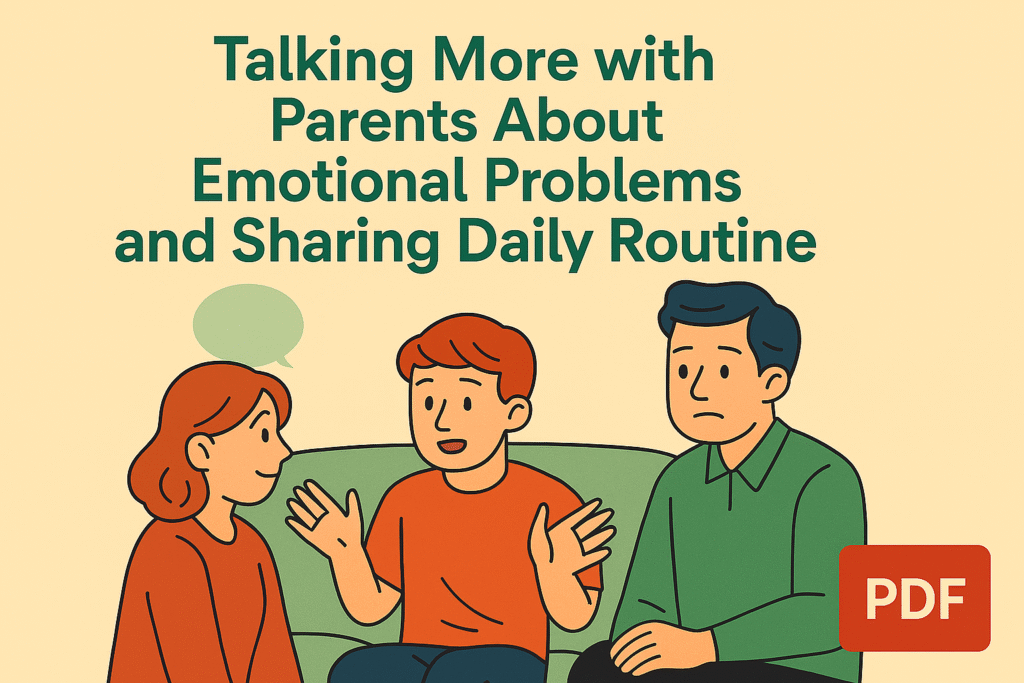Talking to parents about what you’re feeling especially when those feelings are heavy or confusing can be difficult. Whether you’re navigating stress, sadness, anxiety, or just the ups and downs of daily life, it’s not always easy to find the right words or moments to share them with your family.
But opening up emotionally isn’t a sign of weakness it’s a powerful act of trust, and it can build a stronger, more understanding bond with the people who care most about you.
In this post, let’s explore gentle, practical ways to talk to your parents about your emotions and daily life without feeling judged, misunderstood, or overwhelmed.
💬 Why It’s So Hard to Talk Sometimes
Let’s be real: many of us grew up in homes where feelings were rarely discussed openly. Maybe your parents were busy, emotionally unavailable, or just didn’t grow up learning how to talk about emotions themselves. You might worry that:
- They won’t understand.
- They’ll minimize your feelings.
- They’ll overreact.
- They’ll blame themselves.
These are valid fears. But staying silent can lead to bottled up emotions, loneliness, and even resentment. Honest communication is the only bridge that brings closeness and healing and it starts with courage.
🧠 1. Know What You Want to Say First
Before you approach your parents, take a few quiet minutes to understand what you’re feeling and why. You can write it down or even practice saying it out loud. This makes your thoughts feel more organized and less overwhelming when the time comes.
Try starting with:
- “I’ve been feeling anxious lately, and I don’t really know why.”
- “Something happened today, and it’s been on my mind. Can I talk to you about it?”
🕰️ 2. Choose the Right Moment
Timing matters. If your parents are distracted, stressed, or busy, the conversation might not go well. Look for calm, quiet moments like during a walk, while cooking together, or in the evening before bed.
Sometimes, a simple “Hey, can we talk when you’re free?” can set the stage for a more meaningful interaction.

🧡 3. Speak From the Heart, Not from Blame
Use “I” statements instead of “you” accusations. It helps prevent defensiveness and makes room for empathy.
Say:
- “I feel really alone sometimes, and I don’t always know how to ask for help.”
Not: - “You never care when I’m upset.”
Remember: this is not about making them feel bad, but about letting them see what’s going on in your world.
👂 4. Understand That They May Not Get It Right At First
Sometimes parents try to fix instead of listen. They may interrupt with advice, change the topic, or even seem upset. It’s not always because they don’t care sometimes they’re scared too, or unsure how to respond.
If you feel misunderstood, gently let them know:
- “I’m not looking for a solution right now, I just need you to listen.”
- “I know it’s hard to hear, but I need to be honest.”
🤝 5. Start Small and Build Trust
You don’t have to share everything at once. Start by talking about your day the good and the frustrating parts. This builds emotional comfort over time and shows that you trust them with your inner world.
With consistency, they’ll become more receptive and you’ll feel more confident opening up.
🧘 6. Use Other Avenues When Words Feel Hard
If speaking feels too intense, try writing a letter, texting, or sharing something creative like a poem, journal entry, or even a drawing that represents how you feel. These can be powerful conversation starters when words are difficult.
🌱 7. Don’t Give Up Healing Conversations Take Time
If your first attempt doesn’t go well, that’s okay. It doesn’t mean the door is closed forever. Emotional communication is a skill, and like any skill, it improves with patience and practice on both sides.
Sometimes, change happens quietly through one honest talk at a time.
🧩 Final Thoughts: Vulnerability Builds Connection
Opening up to your parents about emotions can be uncomfortable, but it’s also deeply transformative. You’re not just expressing yourself you’re showing them how to grow with you.
And in doing so, you give them the chance to truly see you not just as their child, but as a whole human being with feelings, dreams, and challenges.
Even if they don’t fully understand at first, your honesty can plant seeds of empathy, growth, and deeper love.
👉 Start building stronger relationships one honest conversation at a time.
Visit more blogs for your daily life problems here


Pingback: 📱 How to Reduce Your Toddler’s Screen Time Without Tears or Tantrums? - foncentra.com